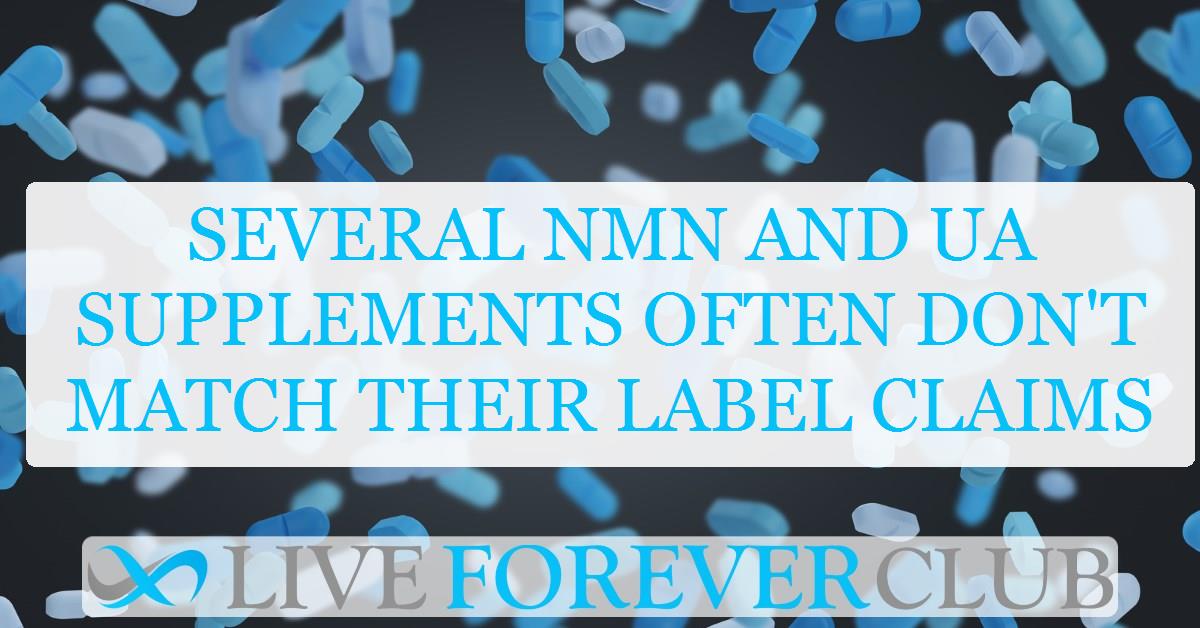In this diverse world of health and wellness, we've all come across supplements that promise the sun, moon, and stars when it comes to longevity and healthy aging. Two such promising compounds are Nicotinamide Mononucleotide (NMN) and Urolithin A (UA). However, we've recently stumbled upon some findings that challenge the trust that consumers put in the supplement industry due to the discrepancies between the actual content of these supplements and what their labels claim.
Promise of NMN and UA
NMN and UA are marketed as geroprotective supplements, which means they help protect against aging and age-related diseases. NMN is a precursor to Nicotinamide Adenine Dinucleotide (NAD+), a molecule essential for energy metabolism and cellular repair. UA, derived from ellagic acid in foods like pomegranates, improves muscle endurance and mitochondrial health.
What is Nicotinamide Mononucleotide (NMN)?
NMN has gained significant attention in recent years for its potential role in promoting longevity. This molecule serves as a precursor to NAD+, a coenzyme found in all living cells that plays a crucial role in energy metabolism and maintaining proper cell function. NAD+ levels naturally decline with age, leading to a decrease in cellular energy and an increase in the risk of age-related diseases.
Research has shown that NMN supplementation can boost NAD+ levels, which in turn may enhance cellular energy production, improve DNA repair mechanisms, and promote overall health. Studies on NMN have demonstrated its potential benefits, including increased insulin sensitivity in pre-diabetic women, enhanced aerobic capacity in amateur runners, and improved sleep quality in older adults.
What is Urolithin A (UA)?
Urolithin A is another promising compound in the realm of geroprotective supplements. It is a microbial metabolite produced in the gut from ellagic acid, a polyphenol found in foods such as pomegranates, strawberries, raspberries, and walnuts. However, only about 40% of healthy individuals have the necessary gut bacteria to convert ellagic acid into UA.
UA has been shown to improve mitochondrial function, which is critical for cellular energy production and overall vitality. Mitochondria, often referred to as the powerhouses of the cell, tend to become less efficient with age, leading to decreased energy levels and increased susceptibility to age-related diseases. By enhancing mitochondrial function, UA can improve muscle endurance, reduce levels of inflammatory markers, and support healthy aging.
Label claims vs. reality
A recent study tested 18 NMN and 5 UA supplements using high-performance liquid chromatography-triple quadrupole mass spectrometry (HPLC-QqQ-MS). The results were alarming: the amount of active ingredients ranged from significantly higher to non-detectable levels compared to their label claims. For instance, one NMN supplement contained 99.2% of the claimed amount, while another had no detectable NMN at all.
Surprising Findings
The study revealed a wide range of discrepancies in the content of NMN and UA supplements. NMN content varied from -100% to +11.2% of the label claims, and UA content showed a range from -15.5% to +28.6%. Such variability suggests issues with both the manufacturing process and regulatory oversight. For consumers, this means that the supplements they rely on may not provide the intended benefits.
Here are some specific findings from the study:
- Five out of 18 NMN supplements had non-detectable levels of NMN.
- Only one out of the 18 NMN supplements had NMN content close to the label claim.
- The UA supplements also showed significant variability, with some products containing more than the labeled amount and others containing much less.
Extent of the problem
The inconsistency in supplement content is not unique to NMN and UA. Similar issues have been reported for other dietary supplements, highlighting a broader problem in the industry. For example, previous studies have shown that melatonin supplements often contain varying amounts of the hormone, and some even contain additional, unlisted ingredients.
Melatonin supplements
A study investigating melatonin supplements found that the actual melatonin content ranged from -83% to +478% of the labeled amount. This variability can lead to significant differences in the supplement's effectiveness and safety. In some cases, supplements contained serotonin, a substance not listed on the label, which could pose health risks.
Vitamin D and K supplements
Another study examined vitamin D3 and K2 supplements and found that only 11 out of 25 products had vitamin D3 content within 95% of the labeled amount. This inconsistency can affect the supplement's ability to support bone health and other physiological functions.
These examples illustrate the widespread nature of the problem and the need for comprehensive quality control measures across the supplement industry.
Why quality control matters
Quality control in supplements is vital for several reasons. First, accurate labeling ensures that consumers get what they pay for. Second, consistent ingredient levels are crucial for safety and efficacy. Without proper quality control, the effectiveness of geroprotective supplements becomes questionable, undermining their potential health benefits.
Consumer trust
Accurate labeling and consistent ingredient levels are fundamental to building and maintaining consumer trust. When consumers purchase a supplement, they expect it to contain the ingredients listed on the label in the specified amounts. Discrepancies between the label claims and the actual content can erode trust and lead to skepticism about the supplement's efficacy and safety.
Safety and efficacy
Inconsistent ingredient levels can also impact the safety and efficacy of supplements. Taking too much or too little of an active ingredient can lead to unintended health effects. For example, excessive amounts of certain vitamins and minerals can cause toxicity, while insufficient amounts may fail to provide the desired health benefits.
In the case of NMN and UA supplements, inaccurate labeling can affect their ability to support healthy aging. Consumers who rely on these supplements to boost NAD+ levels or improve mitochondrial function may not experience the expected benefits if the actual content deviates significantly from the label claims.
Role of regulatory bodies
Under the Dietary Supplement Health and Education Act (DSHEA) of 1994, the FDA regulates supplements as food products, not drugs. This means that manufacturers are responsible for ensuring the safety and labeling accuracy of their products. However, the FDA does not routinely verify the quality of these supplements, leading to significant inconsistencies in their content.
Dietary Supplement Health and Education Act (DSHEA)
The DSHEA classifies dietary supplements as a category of food, subjecting them to different regulatory standards than pharmaceutical drugs. While this classification allows for greater consumer access to supplements, it also places the burden of ensuring safety and labeling accuracy on the manufacturers.
Manufacturers must adhere to Good Manufacturing Practices (GMPs), which provide guidelines for production, quality control, and recordkeeping. However, compliance with GMPs varies across the industry, and the FDA primarily relies on post-market surveillance to identify and address issues with supplement quality.
Need for enhanced regulation
The findings from the study on NMN and UA supplements highlight the need for enhanced regulation and oversight in the supplement industry. More stringent quality control measures and regular testing of supplement products can help ensure that consumers receive safe and effective products that meet their label claims.
Industry Response and Moving Forward
The study's authors contacted the manufacturers with their findings, sparking a dialogue on improving supplement quality. Eleven NMN manufacturers and all UA product makers responded, indicating a willingness to address these issues. Collaborative efforts between industry, healthcare professionals, and regulatory bodies are necessary to ensure the quality and reliability of geroprotective supplements.
The manufacturers' responses to the study's findings were generally positive, with many expressing a commitment to improving their quality control processes. Some manufacturers indicated that they would review and update their production methods to ensure more accurate labeling and consistent ingredient levels.
Collaborative efforts
Improving the quality of geroprotective supplements will require collaboration between various stakeholders, including manufacturers, healthcare professionals, and regulatory bodies. By working together, these groups can develop and implement standards for supplement quality and safety that benefit consumers.
Healthcare professionals can play a crucial role by educating patients about the importance of choosing high-quality supplements and by reporting any adverse effects or inconsistencies they encounter. Regulatory bodies can support these efforts by providing clearer guidelines and increasing the frequency of supplement testing.
Practical Tips for Consumers
While the industry works towards improving quality control, consumers can take several steps to protect themselves when purchasing supplements.
Research the Manufacturer
Before purchasing a supplement, research the manufacturer to ensure they have a good reputation for quality and transparency. Look for manufacturers who adhere to Good Manufacturing Practices (GMPs) and who regularly test their products for purity and potency.
Check for Third-Party Testing
Some manufacturers have their products tested by independent third-party laboratories to verify the accuracy of their label claims. Look for supplements that carry a seal of approval from a reputable third-party testing organization.
Read Reviews and Testimonials
Reading reviews and testimonials from other consumers can provide insights into the effectiveness and quality of a supplement. Be cautious of reviews on the manufacturer's website and look for independent sources of feedback.
Consult a Healthcare Professional
Consulting a healthcare professional before starting any new supplement regimen can help ensure that you choose products that are safe and appropriate for your health needs. Healthcare professionals can also provide guidance on reputable brands and manufacturers.
In sum, it's clear that ensuring quality control in the supplement industry is paramount. Consumers that turn towards promising supplements like NMN and UA for healthy aging deserve assurance that these supplements deliver on their promises. What we need now is greater regulation and accountability in the industry to ensure these supplements benefit those who rely on them.
The research was led by Elena Sandalova from the National University of Singapore. The study recently is published in the journal GeroScience.






